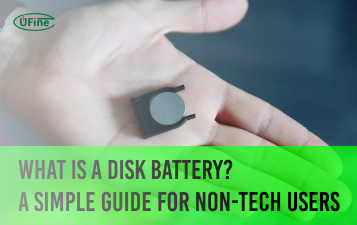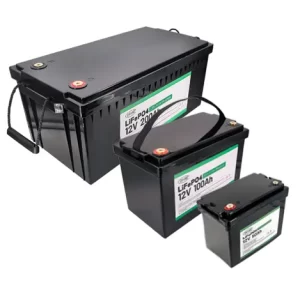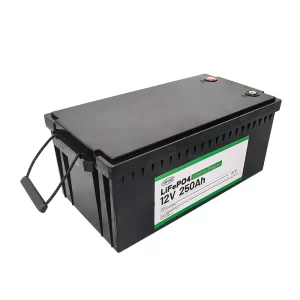Are you looking to power your RV efficiently and reliably? In this article, we delve into lithium camper batteries, exploring their features, joint types, and factors to consider when selecting the perfect battery for your recreational vehicle. Discover how these advanced power solutions can enhance your camping experience and provide long-lasting energy.
Part 1. What are the features of a lithium camper battery?
Lithium camper batteries possess various functional characteristics, making them an excellent choice for powering your RV adventures.
Reliable Power Supply
Lithium camper batteries provide a consistent and reliable power supply, ensuring that your essential appliances and devices operate smoothly during camping trips.
High Energy Storage Capacity
These batteries have a high energy storage capacity, allowing you to power multiple appliances simultaneously without worrying about running out of electricity. Lithium batteries can efficiently handle your power needs, from lighting and refrigeration to electronics and entertainment systems.
Fast Charging Capability
Lithium camper batteries have a fast charging capability, enabling you to recharge them quickly when connected to a suitable power source. This means less downtime and more time to enjoy your camping experience.
Deep Discharge Cycle
Lithium batteries can withstand deep discharge cycles without suffering from significant capacity loss. This means you can utilize more of the battery’s stored energy without compromising its lifespan, ensuring reliable power for extended periods off-grid.
Lightweight and Space-Saving
Lithium batteries are lightweight and space-saving, making them ideal for RVs where weight and space constraints are crucial. Their compact design allows for flexible installation options, ensuring efficient utilization of available space.
Long Lifespan
LiFePO4 batteries have a long lifespan and can endure hundreds or even thousands of charge cycles. This longevity makes them a cost-effective investment, as you won’t need to replace them as frequently as other battery types.
Low Self-Discharge Rate
Lithium batteries have a low self-discharge rate, meaning they retain their charge for extended periods when unused. This is particularly beneficial for RV owners with infrequent camping trips or extended storage periods between adventures.
Maintenance-Free Operation
Unlike some other battery types, lithium camper batteries require minimal maintenance. They do not require regular water monitoring or electrolyte replenishment, saving you time and effort in upkeep.
Versatility
Lithium batteries are versatile and compatible with various charging methods, including solar panels, generators, and shore power. This flexibility allows you to recharge your battery using different sources, ensuring you have power options regardless of your location.
Enhanced Safety Features
Lithium camper batteries have safety features such as overcharge protection, short-circuit protection, and thermal protection. These features help prevent damage to the battery and ensure safe operation during charging and discharging.
Part 2. How do you choose the best lithium battery for an RV?
Battery Capacity
Typically, campervans’ deep cycle battery capacity is in the 150-400Ah range. Still, the 200Ah capacity option will be more widely available. Determine the electrical appliances and devices you’ll use in your RV and calculate the total power consumption. This will help you choose a lithium battery with the appropriate capacity.
Space and Weight
Measure the available space in your RV for battery installation and consider weight limitations. Lithium batteries are generally lightweight and compact, but choosing a size and weight that fit your RV’s specifications is essential.
Battery Lifespan
Look for lithium batteries with a long lifespan, as this will ensure reliable performance over time. Consider the number of charge cycles the battery can endure and the expected lifespan in years. Opt for batteries with a high cycle count and extended warranty periods.
Battery Chemistry
Consider the pros and cons of lithium battery chemistries such as LiFePO4, NMC, LiCoO2, and LTO. LiFePO4 batteries are known for their safety and longevity, while NMC batteries balance energy density and power output.
Check Charging Efficiency
Evaluate the charging efficiency of the lithium battery. Look for batteries that can accept a high charging current and recharge quickly. This is especially important if you rely on solar panels or generators to recharge your battery while off-grid.
Consider Safety Features
Ensure the lithium battery has built-in safety features such as overcharge protection, short-circuit protection, and thermal protection. These features help prevent damage to the battery and ensure safe operation during charging and discharging.
Consider Budget
Set a budget for your lithium battery purchase and compare prices among reputable brands. Trying to find a nearby battery store
Part 3. Common types of lithium camper batteries
Lithium Iron Phosphate (LiFePO4)
LiFePO4 batteries are renowned for their safety and stability. They are less prone to thermal runaway and safer than other lithium battery chemistries. These batteries last longer and can withstand more than 5,000 charging cycles compared to different types of batteries.
Lithium Nickel Manganese Cobalt Oxide (NMC)
NMC batteries strike a balance between energy density and power output. They offer higher energy density than LiFePO4 batteries, providing more energy storage capacity in a smaller, lighter package. NMC batteries suit RV owners looking for a compact and efficient power solution.
Lithium Cobalt Oxide (LiCoO2)
Due to their high energy density, LiCoO2 batteries are commonly found in consumer electronics. However, they are less widely used in RV applications due to safety concerns and a shorter lifespan than other lithium chemistries. While they offer excellent energy density, they may not be the most practical choice for extended off-grid adventures.
Lithium Manganese Oxide (LiMn2O4)
LiMn2O4 batteries are known for their high power output and thermal stability. They are less susceptible to overheating and have a longer cycle life than LiCoO2 batteries. These batteries are suitable for RV owners who prioritize performance and reliability in their power systems.
Lithium Titanate (LTO)
LTO batteries are valued for their fast charging capabilities and long lifespan. They can be charged and discharged rapidly without experiencing significant degradation, making them ideal for high-demand applications such as RVs. While they have a lower energy density than other lithium chemistries, their durability, and fast-charging capabilities make them a practical choice for some RV owners.
Part 4. FAQs
-
What size battery should I use for my camper?
Most campers and RVs operate on a 12-volt DC system. Therefore, choosing a deep-cycle battery with a matching voltage, such as a 12V battery, is advisable. -
How long will a 100Ah lithium battery last in an RV?
The duration a 100Ah lithium battery will last in an RV depends on various factors, such as the power consumption of your appliances, the frequency of usage, and how well the battery is maintained. However, a 100Ah lithium battery can power a moderate load for approximately 10-20 hours under typical usage conditions. -
Which battery is better, 100Ah or 200Ah?
The choice between a 100Ah and a 200Ah battery depends on your specific power needs. A 200Ah battery offers double the capacity of a 100Ah battery, providing longer runtime and the ability to power more appliances. However, it also comes in larger sizes and weights. Consider your space constraints, energy requirements, and budget when deciding between the two. -
Are lithium batteries safe in campervans?
Lithium batteries are generally safe to use in campervans when installed and maintained correctly. They have built-in safety features such as overcharge protection, over-discharge protection, and thermal management systems to prevent accidents. -
Can you run an inverter off a lithium battery?
Yes, you can run an inverter off a lithium battery. An inverter converts DC power from the battery into AC power, allowing you to power appliances that require AC electricity. Lithium batteries can provide the necessary DC power for the inverter, enabling you to use AC-powered devices in your campervan.
Related Tags:
More Articles

What Is a Disk Battery? A Simple Guide for Non-Tech Users
A disk battery is a small, round cell used in watches, remotes, and other electronic devices. It delivers steady power for compact, low-drain devices.
What Battery Powers a Space Heater?
Discover the type of battery that powers space heaters and learn how to choose the right one for efficient heating in your home or office.
What Is an LR14 Battery? Learn About This C-Size Cell
The LR14 battery, also known as a C battery, delivers steady power. Learn its specs, uses, lifespan, and how it compares to other battery types.
Watch Battery Dimensions Chart: Sizes, Voltages, and Equivalents Explained
Understanding watch battery dimensions helps you choose the right size, voltage, and equivalent model to keep your watch running safely and smoothly.
How Long Can You Rely on Battery-Powered Generators?
Discover battery generator runtime & lifespan factors. Learn how to maximize performance and choose the right power solution.





